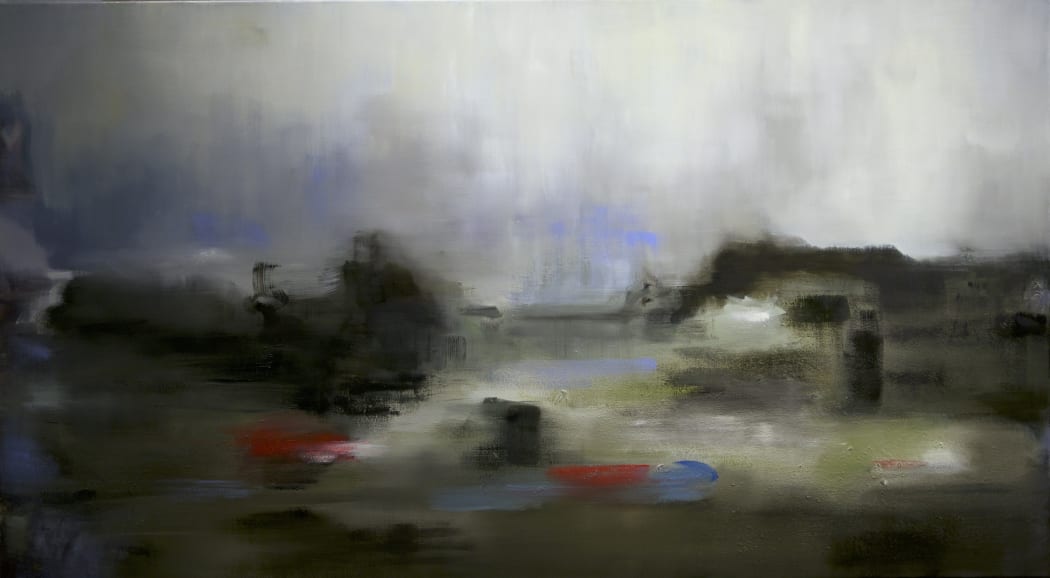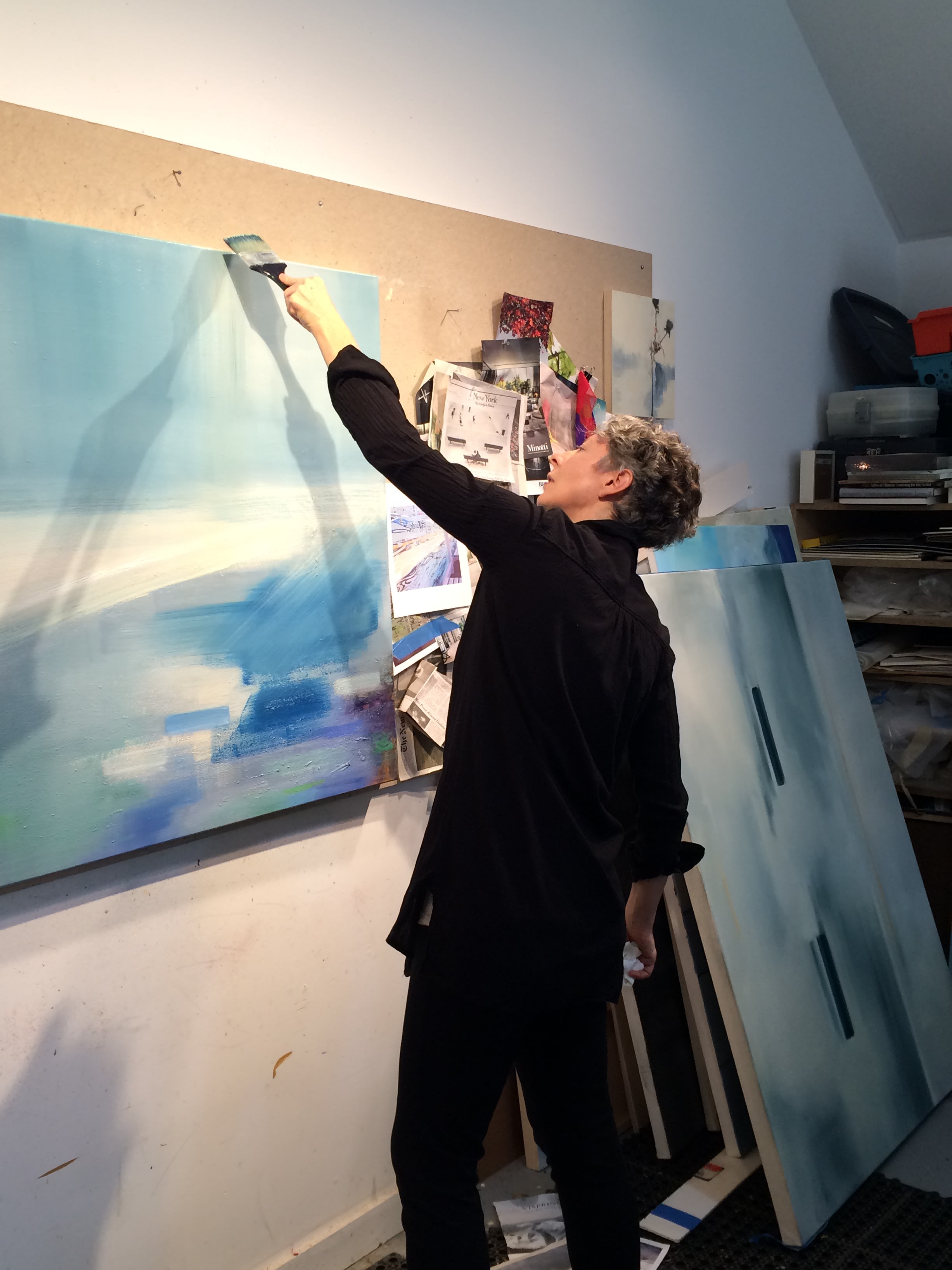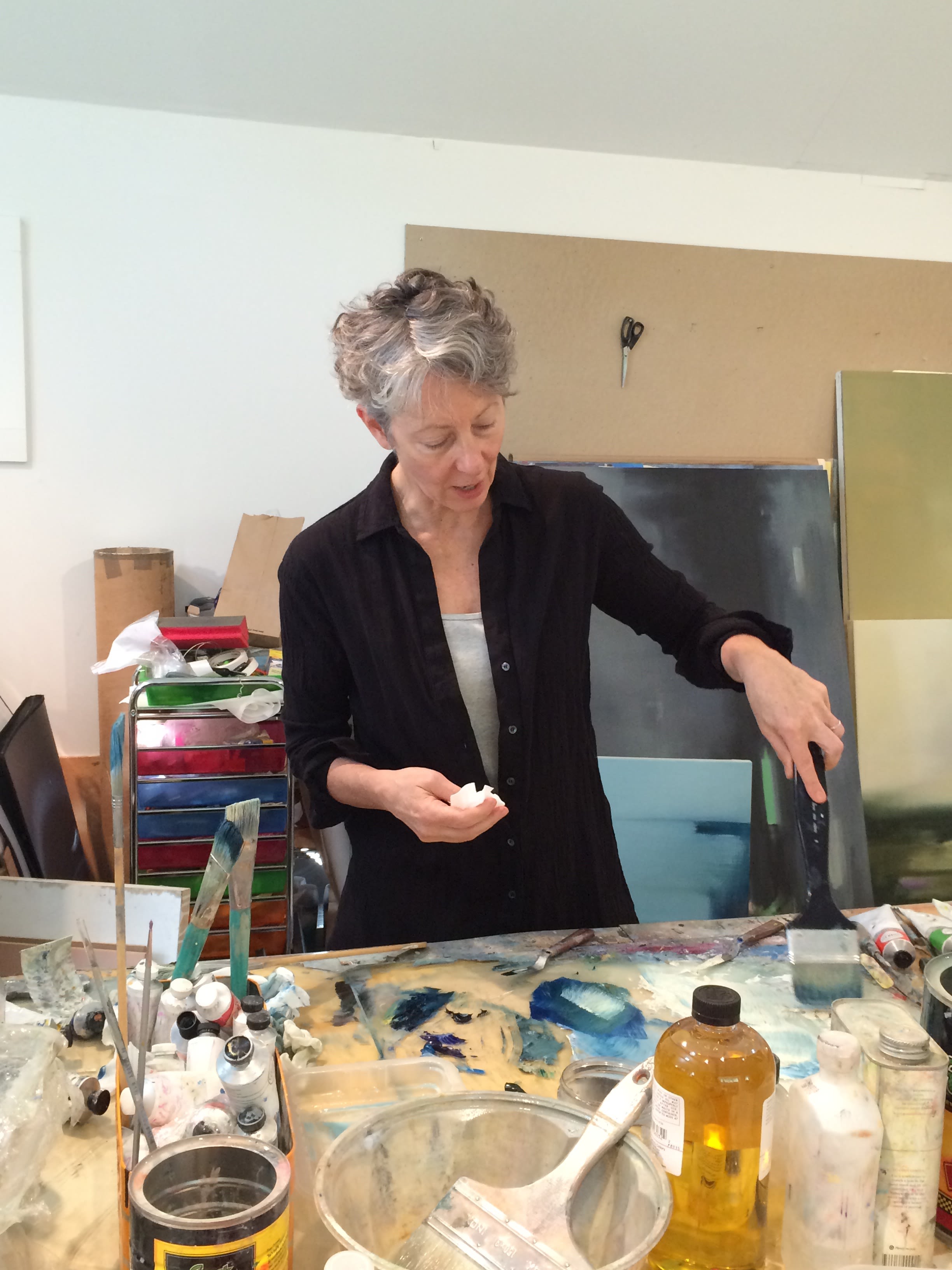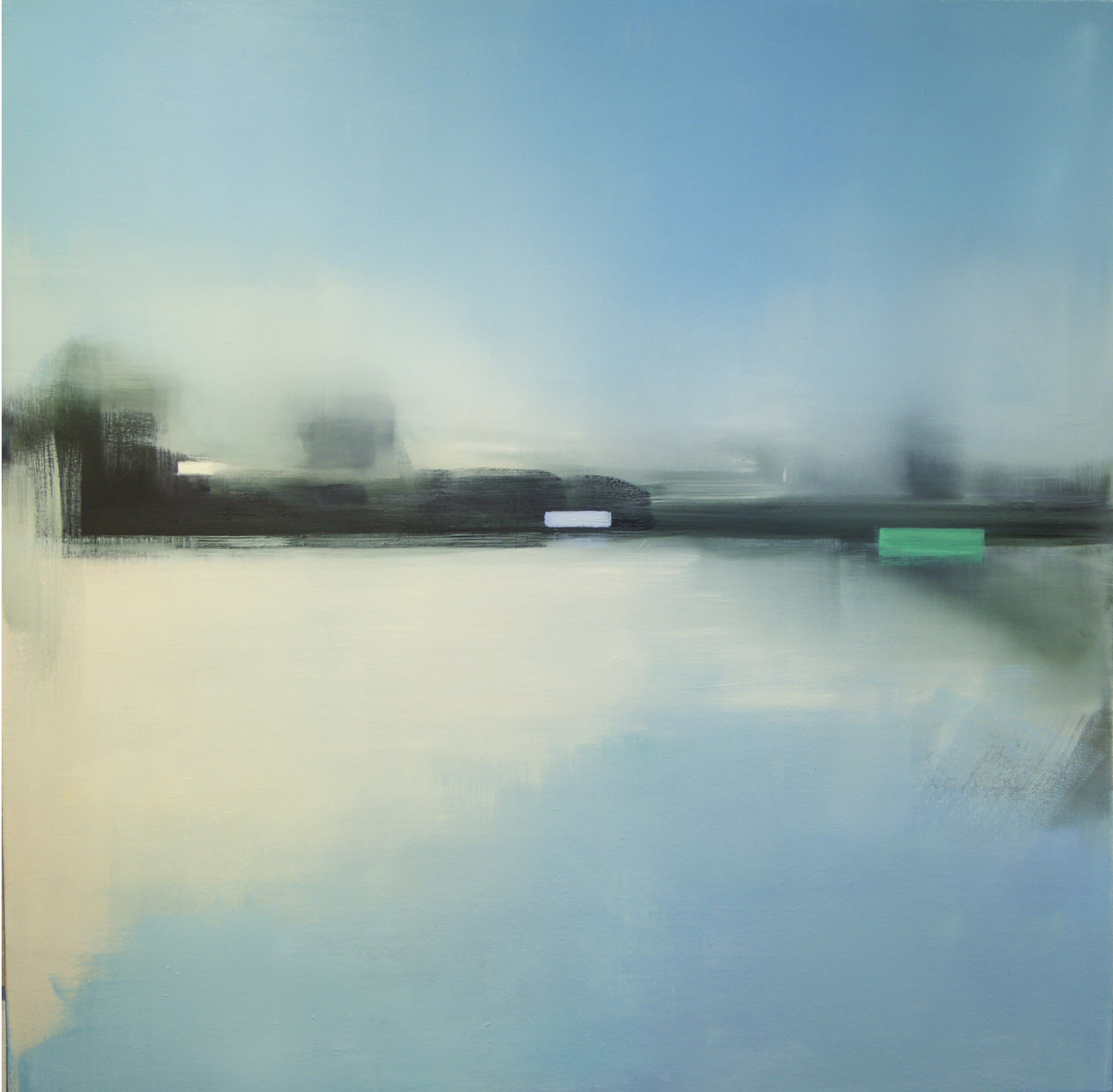
Every week, we'll be sitting down with one of our gallery artists to discuss their work, process, inspiration, and stories. This week we're speaking with Liz Dexheimer.

"Great Open Sky"
Interested in reducing landscape into the most distilled information, Liz Dexheimer translates synthetic elements into a natural environment as a departure point. She deconstructs that manmade imagery, removing anecdotal markers, and explores the light and color that make up the essence of the place. While a limited palette creates an atmospheric depth, Dexheimer punctuates her work with an area of saturated single color to provide focus in contrast to the ethereal. She spoke with us about finding the universality of a landscape, exploring natural elements through manmade structures, and developing the confidence to trust her voice.

Photo courtesy of the artist
What are your earliest memories relating to art, and how did you start becoming an artist yourself?
My earliest memories relating to art are all about staring in wonderment at how color, shape, and form interact to suggest or define objects, space, everything. I still stare; the wonderment has never left me.
I'm not really sure if there was a specific moment that I started becoming an artist. I just always felt that I was an artist; it has always been in me and always been how I've thought about things, expressed myself, and defined myself. My first structured experience is a finger painting class at the Met Museum when I was almost 3 years old. I don't remember a thing about it but I do have a couple of the pieces that my mother saved. I like looking at them occasionally. They remind me that, knowingly or not, I've always been exploring the same ideas of color, space and gesture. I spent my childhood and teens making things whenever I could. That continued into my time after school - finding the time whenever possible while dealing with "the day job" - until finally I was at a place where I could devote myself full-time to the studio.
Eliminating the aspects of my life that got in the way of concentrating on my practice, and also finally having the confidence to be true to my practice and not other people's expectations or norms, were probably the biggest challenges to my overall artistic development.
How did you develop your visual vocabulary? Were there big changes in your work along the way?
The process for finding my visual vocabulary and voice has really just been about working as much as possible. Everything I work on sparks new ideas, new areas to explore. I'm always looking, and my ideas come from so many different sources. Finding my voice was about realizing that it was okay to go with what comes naturally to me and having the confidence to express what I want to the way I want to. I then had to figure out what I needed to do, in terms of image-making, that most fully expressed what I wanted to say.
I have always worked in series. I find that pieces react off each other, spark dialogue, build on each other. But in terms of whether the work itself has changed, yes and no. In my painting, I feel like I've come full circle in a way. My earlier work was very atmospheric and alluded to the sky, water, and horizon lines in much the same way that a lot of the current work does. Now, though, I'm more involved in exploring the idea of suggesting a sense of place, nothing at all specific. There is a vastness, a universality about the infinite view that brings us beyond anything tangible. There is still some sort of narrative present, but for me at least the narrative is about how color, shape, and gesture work together to convey atmosphere and place, not about what's depicted.
What interests you about abstracting landscape?
Actually, what I am doing is abstracting manmade worlds into the natural world. What I abstract isn't normally from nature to begin with. I prefer to use manmade imagery as source material. I'm not interested in replicating nature as much as bringing the other imagery to a place where it conveys the same sensibilities. I like the sense of mystery, ambiguity, ethereality, the sense of place as a landscape, but without the more literal scenic qualities. With the current series, more than ever it's also about natural light, how it plays with what we see, and how it creates atmosphere.
These elements are always what I'm reacting and responding to, whether I'm driving, walking, looking around. There has always been a sensory experience, a sense of limitlessness, vastness, completeness, that doesn't exist in a tangible plane. That, plus the idea of how looking at colors, at patterns, shapes, shades, and marks changes what we see. They play with the picture plane and create a new story with every layer. Again, what I react to isn't necessarily natural to begin with - it could be a billboard, a furniture ad, anything - it's what I see as the possibilities for the beginning of a new image that interest me.
How do you work with color?
In this series I've been using a more limited palette, working with two or three main colors to create the general image. I find that a conversation occurs between the colors, and that blending them gives them roundness, depth, a lack of finite edges. I've been exploring the illusory quality of light, the nuances. I feel I can better convey them with a relatively limited palette. But then I add punctuation marks of purer color to create space, play with the picture plane, throw things a bit out of balance. or just spark a visual cue.
I choose colors depending on my mood, what strikes me at the moment, and how well they work with the overall image rather than how they may connote a natural environment. I'm very aware of how color reacts to other color, and comes alive (or not) based on what other colors are involved.

Photo courtesy of the artist
Is there anything that draws you to a landscape in particular that inspires you to depict it?
I don't come across a particular landscape and say, "Aha, I want to paint that." Again, it's more about the light and how it conveys a sense of mystery and timelessness. I've always been really drawn to various waterscapes, with their reflections and (seemingly) multiple horizon lines, the motion, energy, potential energy, and stillness that co-exist. I'm also drawn to anything with patterning, like horizontals in land, sky, sea, and clouds.
I take visual information that sparks interest in me purely for its visual elements and re-invent it in a way that alludes to the intangible. I'll see elements in manmade imagery and think that would be great as a landscape. I love that the same colors, shapes, forms, and compositions can translate either way. This seems perfectly natural to me - it's always been that whenever I look at anything, regardless of what it is, I register color and shapes before I register content.
Ultimately, though, it's really about the image I've created - does it work or not, does it evoke what I want - and not that much about the source material.
What's your process like?
I do a lot of blending on the canvas. Working wet on wet creates a different sense of dimension and atmosphere. There's a continuum where you can create something without a beginning or an end, eliminating vestiges of the analog painting process. I like paint. I like the viscosity, how it blends, how a stroke of color can convey so much, how a gestural brushstroke can direct the gaze, how the placement of bits of more intense saturated color can play with the picture plane, throwing things a bit askew, adding layers of dimension.
I want the image to look like it was always there, whole, that it's continuing off the canvas. The idea of the continuum is also why I tend to go to nature - there are no discernible beginnings.
Where do you see your work going from here?
I'm not sure. I feel that there is a lot more that I want to say with the series I'm working on now. I know the work will evolve into something else when the time comes. There is no fixed end, but I'll know when it's time to move on. I do tend to go between relatively minimalist and more ornate, or more linear and gestural oriented work. Each new series builds, I hope, upon all that I've done before, and what I've learned.

"Domain Interchange Green"
Explore more of Liz Dexheimer's work here.
Comments
a wonderful interview..... liz is so accomplished... work comes from her soul.
Not only Is Liz's work so beautiful , ethereal and contemplative, but she explains her process in ways that we can comprehend. Gorgeous work in every Way.. and comprehensible explaining. . You want to dive into The canvases and stay there while you meditate.